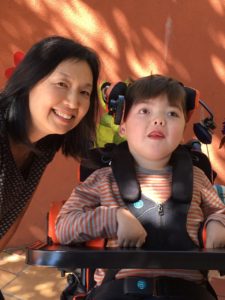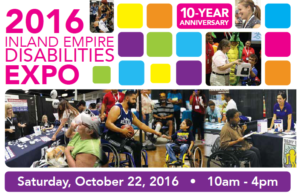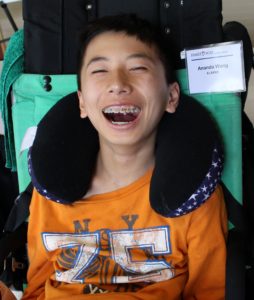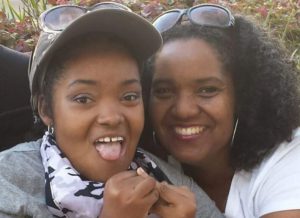This newsletter was sent September 20, 2016. If you’d like to receive our next bi-weekly digest full of a curated collection of resources, workshops, policy highlights, and action items that affect children and youth with special health care needs, please sign up here.
NEWS
Why I’m Fighting The State On Behalf Of My Son: Op-Ed Published By FVCA Project Leadership Graduate
In April, FVCA Project Leadership graduates attended an op-ed writing seminar led by Daniel Weintraub of California Health Report. In this published piece, graduate Yuki Baba discusses the trouble she’s had accessing critical physical therapy services for her 8-year-old son, Nate. Although his physicians agree he has cerebral palsy, Nate’s denied physical therapy through California Children’s Services due to the state’s definition of his disability. To read the op-ed, click here.
For more information on Project Leadership, an advocacy training that equips families with the necessary skills to engage in all levels of decision making on behalf of children with special health care needs, click here.
Related: When Autism Ages Out Of The School System, another op-ed written by a FVCA Project Leadership graduate.
RESOURCES
New Family-Professional Partnerships Section In Pediatrics Journal, Articles Needed
The American Academy Of Pediatrics (AAP) journal, Pediatrics, has launched a new section devoted to highlighting how health care professionals, patients, and families can work together to improve child and adolescent health. Articles are to be co-authored by a health care professional and a patient or family member and are accepted on a rolling basis. All articles focused on family-professional partnerships will be made free to the public.
Sproutflix: Online Streaming Of Films Exclusively Featuring People With Disabilities
With a mix of feature-length documentaries, narratives, short films, animations, and music videos, Sproutflix is home to a diverse collection of movies featuring people with disabilities. Most films can be streamed for seven days for $15, or downloaded for $25. You can save 20% off all titles using the code backtoschool20 (valid until Nov. 1). To browse the films, click here.
New Autism Data Portal From The Child And Adolescent Health Measurement Initiative
Compiling the research from four national surveys, this portal provides easy access to data on the health and well-being of children and families with autism. In addition to helping people learn about family experiences, the portal can be used as an advocacy tool. It also allows you to see how others are using autism data. To access the portal, click here.
UPCOMING EVENTS
Care Parent Network To Host Star Autism Conference In East Bay Area
This conference aims to provide information for families who have children with autism ages 0-14 years. This year’s theme, ‘Moving Forward,’ will encompass topics such as how to handle a diagnosis, working with an applied behavior analysis provider, how to run a successful individualized education plan, and more. Date: Oct. 22. Admission: $25 per person, $40 per family. Limited scholarships and childcare stipends available. For more information, click here.
lnland Empire Disabilities Expo: 10-Year Anniversary Celebration In San Bernardino
This expo showcases the services and products that enhance independent living for people with disabilities. Exhibits will explore housing, transportation, advocacy, employment, assisitve technology, education, and youth initiatives. An entertainment lineup features wheelchair athlete Aaron Fotheringham and more. Date: Oct. 22. Admission: free. For more information, click here.
American Academy Of Pediatrics Annual Conference To Take Place In San Francisco
The AAP National Conference And Exhibition is the largest pediatric technical exhibit of its kind and typically draws more than 10,000 professionals. The three-day conference offers over 350 educational sessions with hands-on learning and networking opportunities. Date: Oct. 22-25. Admission: various price points. For more information, click here, and to review the conference schedule, click here.
*Note: On Oct. 23, the FamilY Partnership Network will host a free networking reception in San Francisco for families who want to learn more about current AAP efforts to promote youth engagement. For more information on attending the reception, click here.
OPPORTUNITIES FOR INPUT
Medical Cannabis Survey From The Child Neurology Foundation
In advance of their upcoming symposium, “Cannabis In Epilepsy: Clinical Science, Parent And Advocacy Perspectives,” the Child Neurology Foundation is looking for information on where advocacy partners, families, and other stakeholders stand on the topic of medical cannabis and epilepsy. To take the 15-minute survey, click here. Surveys must be completed by Sept. 27.
Innovation Challenge: How Do Social Determinants Shape Our Health Landscape?
Let’s Get Healthy California is looking to highlight innovations that address the factors that shape our health, referred to as social determinants. Anyone with a creative idea about how to promote a healthier California is encouraged to apply. Click here for contest details and information. A webinar for interested applicants will be held Sept. 29. To sign up for the webinar, click here.
WEBINARS
Archived Webinar:
Serving Youth With Co-Occurring Developmental And Behavioral Disorders. Click here to watch.
September 22: The First National Survey On Experience Of Care At Hemophilia Centers
Sponsor: Friends Of The National Center On Birth Defects And Developmental Disabilities
More information and registration here.
September 22: Disability Benefits And Cystic Fibrosis
Sponsor: Cystic Fibrosis Foundation
More information and registration here.
September 22: Early Start For Infants And Toddlers
Sponsor: Family Health Outcomes Project
More information and registration here.
September 23: Caring For Children With Sickle Cell Disease
Sponsor: Children’s National Health System
More information and registration here.
September 24: Beginning The Journey: A Family Guide To Navigating Early Intervention
Sponsor: Family Network On Disabilities
More information and registration here (two time options).
September 26: Caring For The Caregiver
Sponsor: Family Network On Disabilities
More information and registration here.
September 27: Zika: What Family Leaders Working In Public Health Need To Know
Sponsor: Family Voices
More information and registration here.
September 28: Maureen Durkin Dissects The Epidemiology Of Autism
Sponsor: Spectrum
More information and registration here.
September 28: The Importance Of Teaching Social Emotional Skills In Early Childhood
Sponsor: Early Childhood Alliance
More information and registration here.
September 28: Predictive Analytics In The Child Welfare System: The Basics
Sponsor: Alliance For Racial Equity In Child Welfare
More information and registration here.
September 29: Are You Concerned About Your Child’s Irritability?
Sponsor: The National Institute Of Mental Health
More information and registration here.
ARTICLES
Passing My Disability On To My Children
Screening Disability In Kindergarten Is Way Too Late, Experts Say
Parents Often Battle To Get Their Children Mental Health Services At School
My Daughter Only Goes To School Twice A Week, But It Means Everything To Us
Health Care Providers Scramble To Meet New Disaster Readiness Rule
Video Exams May Help Kids’ Access To Asthma Care
Language Barriers Impede Treatment Of Children With Special Health Care Needs
Training Police To Better Respond To Autism
Newly Covered By Medi-Cal, Undocumented Children Also Seek Dental Care
High Blood Pressure In Children
More Child Suicides Are Linked to A.D.D. Than Depression, Study Suggests
Parents, Nonprofits Unite To Create More Inclusive Playgrounds
September Edition of ‘Complex Child Magazine:’ Early Childhood
For Kids, Anxiety About School Can Feel Like ‘Being Chased By A Lion’
Camden School Nurses Take On Care Coordination
Child Neglect Claimed In Jerika’s Hospital Battle
Doctors Studied 42 Infants In Brazil With Microcephaly And The News Isn’t Good








